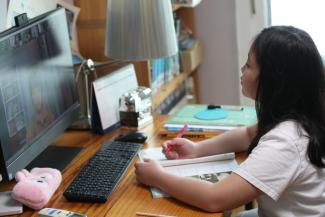Education
Disrupted schooling

Because of the coronavirus pandemic, schools and nursery schools were shut down. Around the world, 1.5 billion children and teenagers were affected. A recent UNICEF publication points out that at least 463 million girls and boys could not even attend their school or nursery school anymore. UNICEF appreciates that 94 % of all countries now have concepts for remote schooling, with poor countries mostly relying on radio broadcasts and more prosperous countries making use of TV and the Internet. The big problem, however, is that about 30% of the target group cannot be reached by these means.
The data show that almost half of them were pre-schoolers. Moreover, 40% of countries did not offer them any support. The authors warn that such failure nor only hurts the affected children's education. There is economic damage too. UNICEF argues that every dollar invested in pre-school education delivers results that are worth nine dollars. More pre-schooling, after all, means fewer students repeating a year later in their school life and fewer dropping out entirely. The impact of pre-schooling on individual life-long incomes is relevant too.
According to UNICEF, remote-schooling programmes reached out more successfully to older students. Moreover, households with older children are typically better equipped technologically than those with small children. In theory, 82% of all girls and boys in upper secondary education could be reached, the publication states.
Of the excluded persons, three quarters live in rural areas. That is true of both rich and poor countries. However, the total share of students who suffered exclusion was larger in poor countries. The authors reckon that this was the case for about 50 % of sub-Saharan girls and boys.
The UNICEF team paid special attention to two issues: governmental education programmes and technical infrastructure. To assess the first, they relied on a survey run by UNICEF, UNESCO and the World Bank in the months May to July. To understand the latter, they used household surveys.
The study does not reveal empirical truth, but only assesses countries' potential for reaching out to children and teenagers at home. The authors state that fewer boys and girls actually took part in remote schooling. They propose that the new remote-schooling approaches should be expanded and improved. They also express the hope that such efforts would benefit the 258 young people around the world who were excluded from formal education even before the pandemic started.
Remote schooling should be designed in ways that serve universal inclusion, the UNICEF paper argues. Infrastructure must be modernised, and both parents and teaching staff must be taught to make use of the new options. UNICEF calls for remote pre-school programmes to be run everywhere because pre-school boosts a child's long-term educational outlook.







